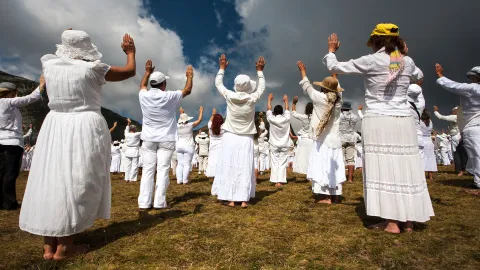Cult Sleep Deprivation

The Weaponization of Exhaustion
Inside almost all cult programming, sleep deprivation emerges as one of the most potent tools in a cult leader’s arsenal of control. This exploration delves into the dark intersection of systematic sleep restriction, neurological disruption, and the profound human cost that reverberates long after survivors have found their way to freedom.
Understanding Sleep as a Fundamental Human Need
Before we examine specific cases, it’s crucial to understand that sleep isn’t merely a period of rest – it’s an active, complex neurological process essential for maintaining cognitive function, emotional stability, and psychological resilience. When cults systematically deny followers adequate sleep, they’re not simply making people tired; they’re dismantling the very framework of human consciousness.
Historical Cases: The Heaven’s Gate Tragedy
In the mid-1990s, Heaven’s Gate cult members adhered to strict sleep schedules designed by leader Marshall Applewhite. Followers were often woken irregularly for marathon meditation sessions and “processing meetings.” Former members report being limited to 4-5 hours of sleep per night, frequently interrupted by mandatory group activities. This regimen was justified as “breaking free from human patterns,” but it effectively maintained a state of perpetual cognitive vulnerability.
Survivors describe a constant haze in which reality begins to blur. One former member, speaking anonymously, recalled: “After months of sleeping in two-hour increments, I couldn’t tell what was a spiritual experience and what was just exhaustion. Everything felt dreamlike, and Marshall’s words became the only solid thing to hold onto.”
The Children of God: Systematic Sleep Disruption
During the 1970s and 80s, the Children of God cult employed what they called “night ministry,” requiring members to participate in prolonged nighttime prayer sessions while maintaining regular daytime duties. Young parents were primarily targeted, with mandatory predawn gatherings that prevented standard sleep patterns from developing. This practice extended to children, who were often kept awake for late-night “sharing sessions.”
The Neuroscience of Surrender: How Sleep Deprivation Alters Brain Function
Modern neuroscientific research reveals the precise mechanisms by which sleep deprivation facilitates cult indoctrination. EEG studies show that after 24 hours without sleep, brain wave patterns begin to exhibit significant disruption. Alpha waves, associated with wakeful relaxation, become erratic, and theta waves, typically present during light sleep, intrude into waking consciousness.
Corydon Hammond, PhD, a psychologist specializing in trauma recovery, explains: “When sleep deprivation becomes chronic, the brain’s prefrontal cortex – responsible for critical thinking and decision-making – shows markedly decreased activity. Meanwhile, the amygdala, our emotional center, becomes hyperactive. This pre-meditated confusion creates a perfect storm where emotional suggestibility increases while analytical capacity plummets.”
Research conducted at major sleep laboratories has documented that sustained sleep restriction leads to:
Disrupted Default Mode Network (DMN) function, affecting self-reflection and personal identity maintenance Compromised hippocampal activity, impairing memory formation and recall Altered neurotransmitter systems, particularly affecting dopamine and serotonin regulation Decreased activity in areas responsible for reality testing and logical reasoning.
These neurological changes create a state in which individuals become increasingly susceptible to external influence and lose confidence in their judgment.
The Psychology of Breaking Down Reality
Sleep deprivation’s effects extend beyond pure neurological impact. The consistent denial of adequate rest creates a psychological environment where maintaining independent thought becomes nearly impossible. As cognitive resources are depleted, cult members find themselves increasingly dependent on group thinking and leader directives.
The process typically follows a predictable pattern: First, sleep restriction creates physical exhaustion. This confusion leads to emotional volatility, making individuals more responsive to emotional manipulation. As critical thinking abilities decline, the cult’s alternative reality seems more plausible. Finally, chronic sleep deprivation can induce dissociative states where members experience a disconnection from their previous identity and beliefs.
Government Applications: Sleep Deprivation as Social Control
The systematic manipulation of sleep patterns extends beyond cult environments into state-level social control. Historical and contemporary evidence reveals how governments have weaponized sleep disruption to diminish public resistance and reshape societal behavior.
The Soviet Union’s implementation of systematic sleep disruption during the Great Terror (1936-1938) provides a stark example. The NKVD perfected what became known as the “conveyor belt” interrogation system, where citizens were subjected to continuous questioning for days without sleep. However, the impact extended far beyond the interrogation rooms. By creating an atmosphere of perpetual anxiety through random night raids and mandatory predawn gatherings, the regime effectively disrupted the sleep patterns of entire communities. Dr. Elena Kravinova, a historian at the
Institute of Social Memory notes: “The population existed in a state of chronic sleep debt. Documentation shows widespread cognitive deterioration among urban populations during this period, making them more susceptible to state propaganda and less likely to engage in organized resistance.”
More recently, the Venezuelan government (2014-2019) employed what researchers term “ambient sleep disruption” during periods of civil unrest. Authorities systematically disrupted standard sleep patterns in regions known for political opposition through mandatory nighttime broadcasts, random neighborhood “security checks,” and the strategic use of industrial noise in residential areas. A 2020 study published in the Journal of Social Psychology reported a 47% decrease in organized protest activities in areas subjected to sleep disruption tactics.
It’s important to note that this list of countries is not exhaustive. The US Congress has outed Meta, an American corporation, and TikTok, a company based in communist China, as egregious offenders who use these same techniques for the same (and more often profit-seeking) motives.
Professor Jason Carmichael, an expert in societal control mechanisms, explains: “Sleep disruption at a population level creates a form of cognitive fog that impairs collective decision-making and community organization. When people are chronically sleep-deprived, they’re more likely to accept authoritarian measures simply because they lack the cognitive resources to formulate effective resistance.”
The neurological impact of these population-level sleep disruption campaigns mirrors what we observe in cult environments but at a macro scale. Research conducted by the International Institute for Social Health has identified consistent patterns:
- Decreased participation in community organization activities
- Increased susceptibility to state media messaging
- Reduced capacity for critical analysis of government policies
- Higher rates of interpersonal conflict within communities
- Diminished collective problem-solving capabilities
These findings suggest that sleep disruption is a powerful tool for social atomization, effectively fragmenting community bonds and reducing collective resistance capacity. The long-term societal impacts often persist for generations, manifesting in elevated rates of anxiety disorders, decreased civic engagement, and persistent distrust in social institutions.
Long-Term Impact: The Aftermath of Enforced Wakefulness
The effects of systematic sleep deprivation don’t end when someone leaves a cult. Survivors often face a constellation of long-term health consequences:
Persistent sleep disorders, including chronic insomnia and irregular sleep patterns. Post-traumatic stress disorder (PTSD) with specific sleep-related triggers and cognitive difficulties, particularly with memory and concentration. Anxiety and depression are linked to disrupted circadian rhythms and increased risk of cardiovascular and metabolic disorders.
Recovery specialist Dr. James Morton notes: “Many survivors struggle with trust – not just of others, but of their bodies. Learning to sleep normally again becomes part of reclaiming their autonomy. It’s not just about getting rest; it’s about healing the deep psychological wounds that sleep deprivation created.”
The Healing Journey: Reclaiming Rest
Recovery from cult-induced sleep deprivation requires a comprehensive approach. Successful treatment programs typically integrate the following:
Sleep hygiene restoration through structured sleep schedules Trauma-informed therapy addressing both psychological and physiological impacts cognitive behavioral therapy for insomnia Amplitude-based neurofeedback to manage anxiety around sleep Support groups connecting survivors with shared experiences
The path to recovery often involves relearning essential trust in one’s body rhythms and sleep needs. Many survivors report that establishing healthy sleep patterns is fundamental to reclaiming their identity and autonomy.
Prevention and Awareness
Understanding how sleep deprivation functions as a control mechanism is crucial for both preventing cult recruitment and supporting survivors. Public education about healthy sleep patterns and the warning signs of sleep-based manipulation can help individuals recognize and resist these tactics.
For those working with cult survivors, recognizing the profound impact of sleep deprivation is essential for providing adequate support. Treatment plans must address both the immediate need for sleep restoration and the complex trauma associated with this form of control.
Conclusion: The Human Right to Rest
Sleep deprivation’s use as a control mechanism in cults represents a fundamental violation of human rights and basic psychological needs. By understanding the neurological and psychological mechanisms involved, we can better support survivors and work to prevent future exploitation. As we continue to study the long-term impacts of systematic sleep deprivation, protecting and respecting natural sleep patterns becomes increasingly apparent. For survivors, reclaiming healthy sleep marks the beginning of a broader journey toward healing and self-reclamation.
-
Social Control. https://www.oxfordbibliographies.com/display/document/obo-9780199756384/obo-9780199756384-0048.xml
- DRS. BRAUN, SACHS, HAMMOND ET. AL. ON RITUAL CHILD ABUSE. https://www.fmsfonline.org/links/braunsachshammond.html
- Cults and mind manipulation: pathology or path of righteousness. https://www.columbia.edu/cu/21stC/issue-1.4/mbmcult.html
- The Relationship Between Social Media Use and Sleep Quality among Undergraduate Students. https://pmc.ncbi.nlm.nih.gov/articles/PMC5881928/

